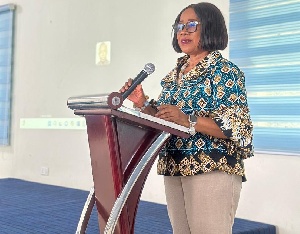- Home - News
- Elections 2024
- News Archive
- Crime & Punishment
- Politics
- Regional
- Editorial
- Health
- Ghanaians Abroad
- Tabloid
- Africa
- Religion
- Photo Archives
- Press Release
General News of Monday, 2 June 2025
Source: www.ghanawebbers.com
Malnutrition in Ghana not just a health concern, it’s a national emergency – WOMEC
Malnutrition in Ghana has reached crisis levels. It must be treated as a national emergency, not just a health issue. Dr. Charity Binka, Executive Director of Women, Media and Change (WOMEC), made this call at a workshop on May 27.
The workshop took place at the Erata Hotel in Accra. It was organized by the Coalition of Actors for Public Health Advocacy (CAPHA) and WOMEC. Media professionals, health advocates, and civil society leaders attended to discuss maternal and child nutrition.
Dr. Binka addressed the participants about undernutrition among children in Ghana. She highlighted limited access to adequate maternal nutrition despite the country's resources. “We are confronting a silent crisis,” she said. “Eighteen percent of children under five suffer from stunting.” She added that seven percent experience wasting.
Dr. Binka explained that Ghana's malnutrition issues stem from systemic gaps. These include access to food, education, service delivery, and political prioritization. “Ghana should not be battling malnutrition,” she asserted.
She noted that the country has fertile lands and capable farmers but lacks coordinated efforts to address nutrition gaps. WOMEC and CAPHA have launched a national advocacy campaign called “Nourish Ghana.” This project aims to increase leadership in combating malnutrition.
Dr. Binka discussed the implications of poor nutrition on health and productivity. Malnutrition weakens the workforce and increases healthcare costs, she stated. It also reduces school performance and robs children of their potential.
She urged the government to prioritize nutrition across all sectors with proper budgeting at all levels. “This is about unlocking Ghana’s full potential,” she emphasized.
Dr. Binka called for promoting exclusive breastfeeding and safe complementary feeding using local foods prepared hygienically to improve nutrition.
She highlighted the media's role in changing perceptions around nutrition in Ghana. “The media can shape public opinion,” she said, urging them to elevate malnutrition on the national agenda.
Over the next year, WOMEC and CAPHA will engage key stakeholders like parliamentarians and development partners while launching media campaigns for advocacy.
Dr. Binka concluded with a rallying cry: “Let us envision a Ghana where no mother watches her child grow weak from hunger.” The workshop marked an important step toward sustained advocacy against Ghana’s nutrition challenges.











